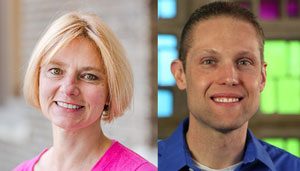A professor of school counseling and a Ph.D. graduate of the School of Education are sharing the Association for Counselor Education and Supervision’s Publication in Counselor Education and Supervision Award this fall for their book, Group Counseling with LGBTQI Persons.
Longtime friends and collaborators Melissa Luke, associate professor of counseling and human services and coordinator of school counseling at Syracuse University, and Kristopher Goodrich G’09, program coordinator and assistant professor of counselor education at the University of New Mexico, will receive the award, which “honors a significant publishing effort by an ACES member focusing on the education and supervision of counselors within the last two years.”

The book, published in 2015, addresses the lack of literature and counselor training on group work with lesbian, gay, bisexual, transgender, questioning and intersex (LGBTQI) clients.
Luke and Goodrich offer strengths-based, group counseling strategies to meet the needs of LGBTQI clients in a range of settings: child and adolescent; same-gender adult; intersex and transgender; coming out/disclosure; school, community outpatient, and residential; couples and family; substance abuse; grief and loss; and advocacy.
“Not only is it probable that a group leader will work with LGBTQI group members, but the group leader is also likely to encounter a larger number of group members who live with and love LGBTQI persons,” Luke and Goodrich write in the book’s introduction.
“Thus, we approach this book with a belief that without more knowledge, awareness and skills in working with LGBTQI persons, group leaders are at risk of stereotyping and perpetuating societal misattributions, which both can be harmful to individuals and groups. [This] book is also predicated on the belief that with increased knowledge, awareness and skills, group leaders can utilize the unique properties and growth-promoting experiences for all group members, specifically LGBTQI members.”
Professor Nicole Hill explains the importance of group work here: “The criticality of group work with the LGBTQI community cannot be overstated, especially in the current climate with systems-level marginalization and individual-level attacks that we see in our society. Group work becomes an important therapeutic intervention that builds resiliency, promotes feelings of universality, and encourages empowerment.”
Master’s students in programs accredited by the Council for the Accreditation of Counseling and Related Educational Programs must have experience as a group member for a minimum of 10 hours and gain knowledge and skills in group counseling skills, group types, member roles, group dynamics and processes, and ethically and culturally relevant group strategies, Hill says.
“To meet the unique needs of the LGBTQI community, group counselors need ongoing opportunities to expand and deepen their counseling skills. Advanced group counseling skills that meet the needs of different cultural groups needs to be a continual area of professional interest and engagement for counselors conducting groups with their clients and students.”
Counseling and Human Services’ seven signatures include Socially Just Advocacy and Activism. “Dr. Luke’s leadership in this domain has practical applications that are informed by research. The practical implications are embedded in our curriculum and the professional identity we work to cultivate with our graduate students, says Hill, who won the same ACES honor in 2009.
